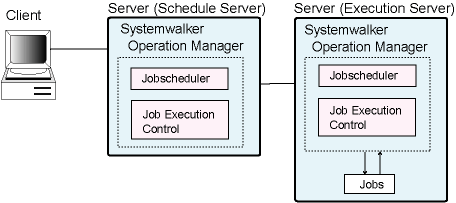Systemwalker Operation Manager can schedule and execute jobs using the following functions.
Jobscheduler function
This function manages job schedules, and also manages, controls and monitors each job.
Job Execution Control function
This function manages and controls the job execution environment, and also executes network jobs.
Jobs can be scheduled and executed using the following basic operation configurations.
Executing jobs on a single server
Scheduling and executing jobs on different servers
Each operation configuration is explained below.
Executing jobs on a single server
Jobs can be scheduled, managed, executed, monitored and controlled on a single server. The following figure illustrates an example of operation configuration where jobs are executed on a single server.

Scheduling and executing jobs on different servers
Using the Job Execution Control network job function, one server can be used solely for managing job schedules and another server can be used solely for executing jobs.
In this type of configuration, the server mainly used for managing job schedules, executing jobs automatically, monitoring and controlling jobs, and submitting network jobs is called the "schedule server." The server mainly used for setting up and controlling the job execution environment is called the "execution server." Systemwalker Operation Manager must be installed and set up on both the schedule server and the execution server.
The following figure illustrates an example of a configuration where jobs are scheduled and executed on different servers.

The main roles of this Systemwalker Operation Manager server are to manage job schedules and control job execution. To use a server as a schedule server, set up calendars and job schedules on the server. When jobs are scheduled, a schedule information file is created.
The main role of this Systemwalker Operation Manager server is to execute jobs. Network jobs can be submitted from the schedule server to the execution server using the Job Execution Control network job function.
Information
Schedule information files are files that store schedule information for jobs. The schedule information files are as follows:
"project-name.dbz" files located under the database directory of the Jobscheduler
"project-name.grz" files located under the database directory of the Jobscheduler
By linking to multiple execution servers, jobs for different projects can be executed on different servers, as shown in the following example.

Scheduling and executing jobs in different zones
This configuration uses the Zone function supported by Solaris 10 or later.
In this configuration, the Job Execution Control network job function is used so that the Global Zone is used solely for job scheduling and Non-global Zones are used solely for job execution.

The Zone function makes it possible to use zones like single servers. Multiple logical servers can be created on a single physical server.
Systemwalker Operation Manager operates by regarding a single zone as a single server. Using the logical IP addresses assigned to each zone, network jobs can be submitted as follows:
From a zone to another zone
From another server to a zone
From a zone to another server